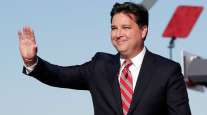Senior Reporter
Transportation Experts Debate Proposals for Keeping Highway Trust Fund Solvent

“The need for a new stable source of transportation revenue is more pressing than ever,” Kevin DeGood, director of infrastructure policy at the Center for American Progress, said at a May 14 Infrastructure Week event on the Hill. “Since 2006, Congress has transferred more than $65 billion from general funds into the Highway Trust Fund to stave off insolvency.”
Uncertainty over the fate of the trust fund has caused some states to prepare two different transportation budgets, one that assumes continued levels of federal funding and the other estimating cuts, DeGood said.
CAPITOL AGENDA: Daily coverage of Infrastructure Week
The event was sponsored by the Eno Center for Transportation and the American Action Forum.
Rep. Jim Renacci (R-Ohio) said his proposed bipartisan legislation indexes the gas and diesel user fees to inflation, raising about $27.5 billion and providing infrastructure funding through 2016. After that, Renacci said his bill would appoint a special bicameral, bipartisan commission to study long-term fixes.
Renacci said he opposes again dipping into the general fund to keep the trust fund insolvent.
“If the general fund has a surplus, then maybe we could go into the general fund,” Renacci said.
Doug Holtz-Eakin, president of the American Action Forum, said he is “politically fatigued” by the fight in Congress over transportation funding.
“I’m really tired of this show,” he said. “There’s a logic to what the congressman has proposed, there’s a logic to a vehicle miles tax, and there’s a logic to a lot of 21st-century fee-based funding systems. But I don’t see the politics lining up in the foreseeable future.”
Rob Atkinson, president of the Information Technology & Innovation Foundation, suggested that a vehicle miles tax would be easy to administer and a fair user-based revenue producer. He said that “Big Brother” concerns associated with a VMT that is assessed electronically through a black box on motorists’ dashboards are without foundation.
“The government cannot track you,” Atkinson said.
“I think the problem with American politics is that people want to fund infrastructure for free, or they want someone else to pay for it,” Atkinson said.
Rob Atkinson from ITIF: "if we're going to build infrastructure, someone has to pay for it" #htf #RebuildRenew
— Eno Transportation (@EnoTrans) May 14, 2015
Jeff Davis, a senior fellow at Eno, said that several proposed “repatriation” bills that would tax overseas profits of U.S. multinational corporations “is just not going to happen.”
“The administration’s proposal basically would require General Electric to write a $16.7 billion check to the Highway Trust Fund, Microsoft $13 billion, Pfizer $10.4 billion, Apple $9.8 billion, IBM $8.4 billion,” he said.
Jeff Davis of ETW: "if we want to budget honestly and keep the #HTF solvent, we need to manage general funds outside of it"
— Eno Transportation (@EnoTrans) May 14, 2015




